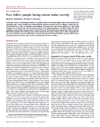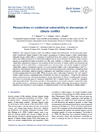-
4 Billion Face Regular Water Scarcity, and Three Climate Conflict Narratives
February 25, 2016 By Gracie Cook In a study published in Science Advances, Mesfin M. Mekonnen and Arjen Y. Hoekstra estimate that over 4 billion people, approximately two-thirds of the world’s population, face severe water scarcity for at least one month out of the year – far greater than previous estimates of between 1.7 billion and 3.1 billion. The authors examined global water scarcity data from 1996 to 2005 on a monthly basis and at a more localized resolution to show how water scarcity affects different places at different times of year. Population growth, intense irrigated agriculture, and climate change all contribute to growing water scarcity. The most vulnerable regions are in India, China, Australia, the western United States, and the Arabian Peninsula. Managing Earth’s freshwater resources while keeping up with the demand of a growing population “will be one of the most difficult and important challenges of this century,” write the authors. They suggest communities and businesses focus more on efficiency, work towards better cooperation around shared resources, and institute caps on consumption in river basins.
In a study published in Science Advances, Mesfin M. Mekonnen and Arjen Y. Hoekstra estimate that over 4 billion people, approximately two-thirds of the world’s population, face severe water scarcity for at least one month out of the year – far greater than previous estimates of between 1.7 billion and 3.1 billion. The authors examined global water scarcity data from 1996 to 2005 on a monthly basis and at a more localized resolution to show how water scarcity affects different places at different times of year. Population growth, intense irrigated agriculture, and climate change all contribute to growing water scarcity. The most vulnerable regions are in India, China, Australia, the western United States, and the Arabian Peninsula. Managing Earth’s freshwater resources while keeping up with the demand of a growing population “will be one of the most difficult and important challenges of this century,” write the authors. They suggest communities and businesses focus more on efficiency, work towards better cooperation around shared resources, and institute caps on consumption in river basins. An article in the open-access journal Earth System Dynamics investigates the narratives through which climate and security are being studied and their portrayals of vulnerability. The authors, Uche Okpara, Lindsay Stringer, and Andrew Dougill, explore three main climate conflict discourses: climactic centrism, context centrism, and denial claims. The three differ in which issues they recognize as central, their assumptions about causality, and their recommended responses. Ultimately, the authors write, because climate change interacts with a variety of governance and social factors, it should be analyzed through a contextual, needs-based lens in places like Africa where human security is a priority. Contextual vulnerability “can be more apt for studying current vulnerability to the social impacts of climate change, such as conflict and violence,” because it best accounts for the social, political, and security components of societies.
An article in the open-access journal Earth System Dynamics investigates the narratives through which climate and security are being studied and their portrayals of vulnerability. The authors, Uche Okpara, Lindsay Stringer, and Andrew Dougill, explore three main climate conflict discourses: climactic centrism, context centrism, and denial claims. The three differ in which issues they recognize as central, their assumptions about causality, and their recommended responses. Ultimately, the authors write, because climate change interacts with a variety of governance and social factors, it should be analyzed through a contextual, needs-based lens in places like Africa where human security is a priority. Contextual vulnerability “can be more apt for studying current vulnerability to the social impacts of climate change, such as conflict and violence,” because it best accounts for the social, political, and security components of societies.Sources: Science Advances, Earth System Dynamics.
 A Publication of the Stimson Center.
A Publication of the Stimson Center.





